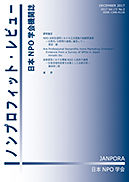Volume 11, Issue 1
Displaying 1-4 of 4 articles from this issue
- |<
- <
- 1
- >
- >|
Articles
-
2011 Volume 11 Issue 1 Pages 1-10
Published: 2011
Released on J-STAGE: December 20, 2011
Download PDF (674K) -
2011 Volume 11 Issue 1 Pages 11-20
Published: 2011
Released on J-STAGE: December 20, 2011
Download PDF (433K) -
2011 Volume 11 Issue 1 Pages 21-31
Published: 2011
Released on J-STAGE: December 20, 2011
Download PDF (584K) -
2011 Volume 11 Issue 1 Pages 33-43
Published: 2011
Released on J-STAGE: December 20, 2011
Download PDF (501K)
- |<
- <
- 1
- >
- >|
